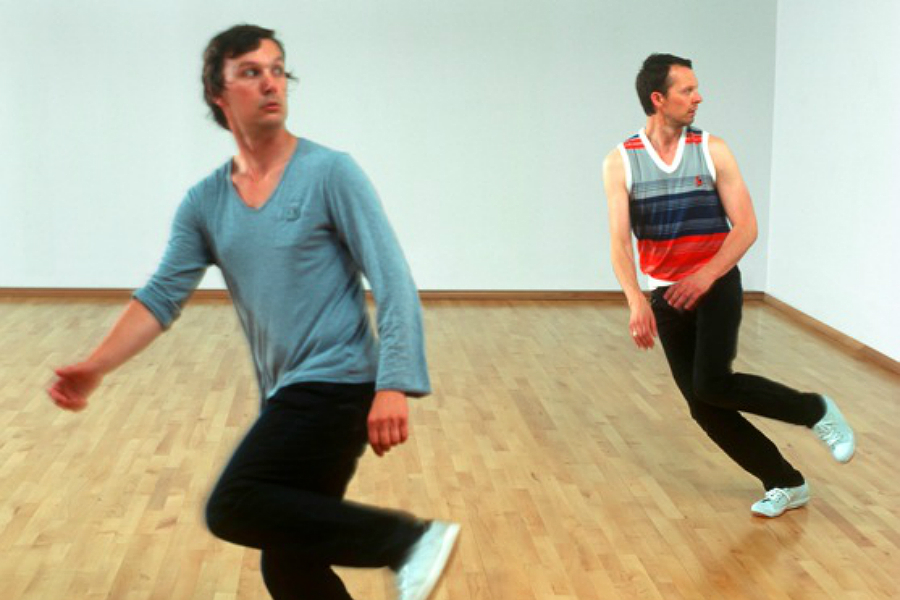How Do You Feel?

C James Fagan finds that rarest of things: a performance piece it’s ok to laugh at…
How do you feel? How do you feel about your body? That phrase is bouncing around my head as I ready myself to see the New Art Club’s piece this past Friday at The Bluecoat. It plays through my mind in the tone of a narrator from a late-seventies schools programme. I’ve seen plenty of dances or performances that explore the human body, but rarely many that promise comedy.
So what to expect, what will emerge from the hospital screen in the middle of the performance space? When it begins, a voice booms through the ether; excitable, breathless, it introduces the show with abandon; an honest abandon as we are informed that this is a preview and they’re ‘making this shit up!’. With that, the New Art Club, (Tom Roden and Peter Shenton), come bounding on, all high energy, like stereotypes of over enthusiastic ‘Kidz’ TV presenters.
They go straight for audience interaction, getting us cheering in response to a series of questions about how we feel about our bodies. They pick someone from the front row who is subjected to some mocking praise and spend most of the opening prancing across the stage in a ridiculous yet infectious way, imagining what it would be like to be an old man, a butterfly, a little girl. It’s an opening salvo of silliness and I begin to wonder if they can keep up this level of energy.
What this rush of an opening seems to do is to act as a fast track to getting on board with the style of the New Art Club’s humour; very much the insertion of tongue into cheek. I’ve been to many performances where there’s been an abject uneasiness about laughing at what’s going on; now the audience have no choice but to.
Even when Tom adopts a more serious tone and begins to talk about people’s reluctance to show their bodies, even to their doctors. Any potential seriousness is undermined by Pete’s apparent ignorance, the only contribution he can make is related to avocados. At this point we see the traditional double act structure of straight and funny man; though that relationship is probably more fluid with this duo. That said, there’s still the idea that within a double act, humour is derived from one being undermined by the other.
Its zenith, its punch line, occurs after a strangely salacious striptease, performed by Tom behind the hospital screens. I won’t spoil what follows, but safe to say, all the elements of English humour seem to be in this moment: surprise, embarrassment, awkwardness and more (much more). This is followed by some more audience interaction, then Tom performs a monologue about talking to his ‘bumhole’ in the middle of the night; it’s oddly touching this little tale of a man and his body.
Then it’s Pete’s turn to do a monologue, this one is about his heart-attack. It’s an animated tale as Pete falls around detailing the terror, hope, and his Morphine influenced love of a German nurse called Hans. Of course, this revery is thwarted by Tom, who dismisses the story as self-indulgent and boring. In fear of losing the audience Tom suggests a dance to win us back, this comes in the form of what can only be called the ‘Bum Bum, Thumb Thumb, Gum Gum’ dance. One which I shall not describe as I feel it has to been seen to be fully appreciated. Yes, you had to be there.
Before we know it we’re heading towards a climax, and the pair decide to end on a big song and dance number, once again involving people from the front rows. The whole thing ends in a crescendo of capering silliness, Pete and Tom controlling the stage like demented primary school drama teachers facing their last day on earth. It makes for a totally satisfying sugar rush of an ending.
It also leaves me with a dilemma of sorts. As a critic I’m used to writing stuff like ‘by acting as butterflies the New Art Club allows us to reconsider the whole of human existence’, but its feels irrelevant to write about the performance in that way. Or perhaps I could have written more words detailing more of the show; the body language bit or the granddad’s shed song.
The New Art Club make it irrelevant because their blend of silliness and performance make for something which is of the moment: great to experience but hard to explain. What I’m attempting to say is that the whole thing was a lot of fun!
That may sound like damning with faint praise, but remember, there’s nothing more serious then comedy.
C James Fagan





